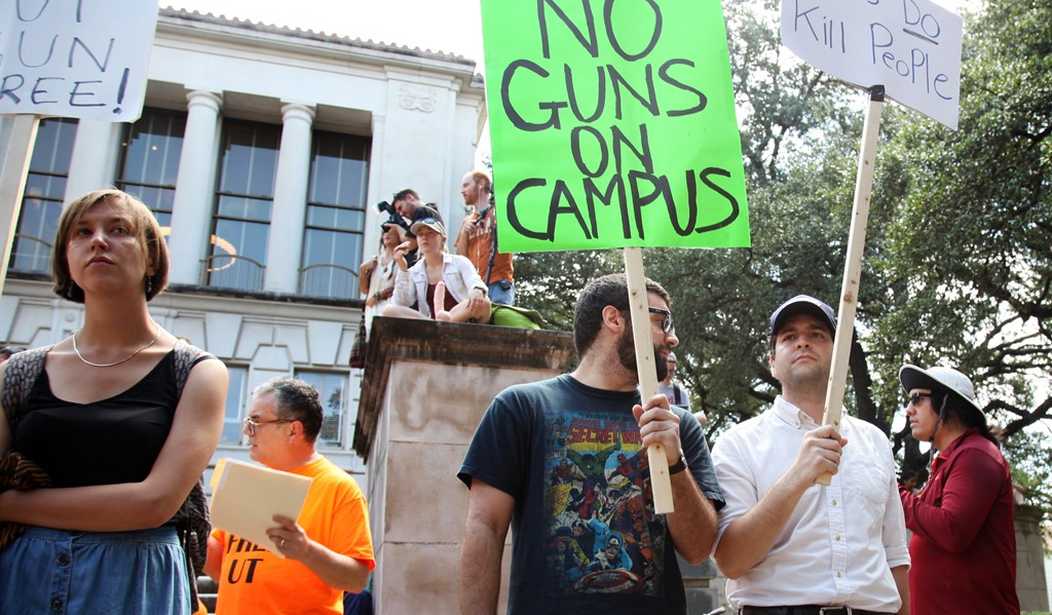A bill allowing concealed carry on the campuses of South Dakota's public colleges and universities made major progress this week, but not without a few changes along the way.
SB 100 was approved by the full South Dakota Senate on Wednesday by a vote of 33-2, though the measure was amended to carve out a few exceptions where lawful carry would still be forbidden.
As written by Sen. Mykala Voita, SB 100 simply prohibited public colleges and universities from enacting any "gun-free zones" on campus. The bill received pushback from a number of higher ed officials, including University of South Dakota President Sheila Gestring, who argued that spaces like research facilities and clean rooms should still be "gun-free."
After the Senate State Affairs Committee gave its stamp of approval to SB 100 earlier this week, I predicted that there'd be attempts to change the bill once it hit the Senate floor, and that did indeed occur. The bill was amended to prohibit lawful carry in "a clearly designated portion of a building or structure" where the following are present:
- More than fifty-five gallons of flammable liquid
- Significant quantities of hazardous materials
- Cylinders containing corrosive, reactive, flammable, toxic, or oxidizer gases
- Cylinders of acetylene gas
- Magnetic resonance imaging equipment or nuclear magnetic resonance equipment
- Rooms used for manufacturing or scientific research, if the concentration of airborne particles is controlled in order to maintain an environment with minimal pollutants
- Clearly designated portions of a building or structure to which a facility security clearance applies or for which a federal security clearance is required
- Buildings or structures during a special event, provided metal detectors and armed security personnel are present at every public entrance to restrict the possession of any dangerous weapon
Though Voita said she preferred the clean bill she introduced, she was willing to work with the Board of Regents on what are fairly minor restrictions, and ones that would still allow for lawful carry in the vast majority of the public campuses across the state.
“South Dakota is a constitutional carry state, which means that a permit is not required to carry a concealed self-defense weapon across our state," Voita said. "There are no laws against law-abiding adults stepping foot on the campus of a higher education institution without a firearm.”
The proposal also corrects the right to carry stun guns and chemical sprays, SDBA reports.
Opponents argued the measure is unnecessary. Sioux Falls Democratic Sen. Jamie Smith said the Legislature’s consensus view on firearm laws isn’t in line with all South Dakotans.
“Everybody doesn’t agree that this is fixed to where we want it to be," Smith said. "There are many South Dakotans that don’t hold that same view. We need to acknowledge them, and at least let them know that there are people in the building that represent them too.”
Okay, they're acknowledged. But can Smith acknowledge in return that they're the minority in South Dakota, just like Democrats are in the state legislature?
South Dakota has steadily been expanding and strengthening the right to keep and bear arms in recent years, and it's not like Republicans have paid a price at the ballot box. Constitutional Carry was enacted in 2019, and the following year Republicans picked up two additional seats in the state Senate and three more seats in the state House. That might not sound like a lot, but when you consider that the GOP already had a 30-5 majority in the Senate and a 59-11 majority in the House before the elections, it's pretty remarkable.
Currently Republicans have a 30-4 majority in the Senate and a 62-7 majority in the House, so it's abundantly clear that residents haven't felt the need to punish the GOP for its pro-2A stances, and there's no reason to think that will change if SB 100 becomes law.
There's still the possibility that the House will make further changes, however, so those South Dakotans who want to see a strong campus carry bill need to reach out to their state representatives and urge them to adopt SB 100's current language without any more amendments.








Join the conversation as a VIP Member